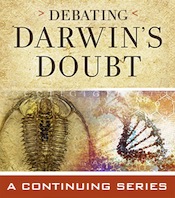 Evolution
Evolution
 Intelligent Design
Intelligent Design
The American Spectator Warmly Welcomes Darwin’s Doubt
 When reviewer John Farrell in National Review trash-talked Stephen Meyer’s new book, focusing his condemnation on an instance of debatable punctuation (the purportedly faulty use of an ellipsis), Darwinists rejoiced. Wrote Jerry Coyne:
When reviewer John Farrell in National Review trash-talked Stephen Meyer’s new book, focusing his condemnation on an instance of debatable punctuation (the purportedly faulty use of an ellipsis), Darwinists rejoiced. Wrote Jerry Coyne:
The National Review is a conservative magazine, so it’s all the more heartening that it just published a review of Stephen Meyer’s new pro-intelligent-design book (Darwin’s Doubt) that is a total pan.
Casey Luskin deconstructed Farrell pretty thoroughly here. Now another conservative journal weighs in. Tom Bethell’s superb review of Darwin’s Doubt in The American Spectator does something I have not seen in any of the hostile reviews that I’ve read so far: he tells you exactly what’s in the book, in detail. Revolutionary! Isn’t that revealing?
He begins:
Recently the Discovery Institute’s Stephen Meyer published Darwin’s Doubt, a book that raises many questions about the theory of evolution. As his title tells us, Darwin himself shared one of these doubts. The book has sold well, reaching #7 on the New York Times bestseller list, #4 on the Los Angeles Times list, and #10 on Publishers Weekly.
Organisms are intelligently designed, says Meyer, who has a PhD from Cambridge University in the philosophy of science. His book is an education, demanding attentive reading but no specialized knowledge. To a large extent it uses the facts and arguments of professional biologists, some bordering on open dissent from the orthodoxy.
Darwin’s Doubt has also been subjected to a barrage of what can only be called hate. “Mendacious intellectual pornography” is among the more inventive descriptions. Hundreds of negative comments appeared on Amazon review page within hours of the 498-page book’s publication.
Donald Prothero, a geologist and research associate at the Natural History Museum in Los Angeles, typified many when he said that Meyer is a “fool,” “incompetent,” guilty of “ignorance,” in “way over his head,” with a “completely false understanding of the subject.” Further, Meyer argues “dishonestly,” promotes a “fundamental lie,” promotes a “fairy tale,” and so on.
Would a scientist make his case that way if he had real arguments? Prothero did attempt a few substantive criticisms, but inadvertently demonstrated that he had not read Meyer’s chapters that had already addressed them. Prothero, in truth, hankers after creationism as his preferred target. But Meyer’s book is devoid of creationism or biblical references. It’s all science.
Along with the attacks, we find more and more biologists recognizing that intelligent design (ID) is a serious endeavor. Meyer’s book has been praised by George Church, a professor of genetics at Harvard Medical School; Scott Turner, a professor of biology at SUNY; Russell Carlson, a professor of biochemistry at the University of Georgia and a dozen others.
Bethell concludes sagely:
This much is clear: The Darwinists cannot live with ID as their enemy. They can easily co-exist with creationism, but that came from the Bible, which can be dismissed in our secular age. They rage at ID, on the other hand, because it challenges them in what they have seen as their strong suit: Science.
Which is exactly right. Read the rest for yourself. Bethell is a wonderful writer — crisp, intelligent, admirably clear, stubbornly independent.
You might not like what Stephen Meyer has to say in Darwin’s Doubt, but a competent critic knows you need to react to what the author actually argues. By contrast, Meyer’s critics have mostly refused to grapple with the main contentions of the book, the categories of evidence it advances. When you call them on this, they refuse to respond. Or in Farrell’s case, they reply with name-calling.
Tells you something, doesn’t it?
